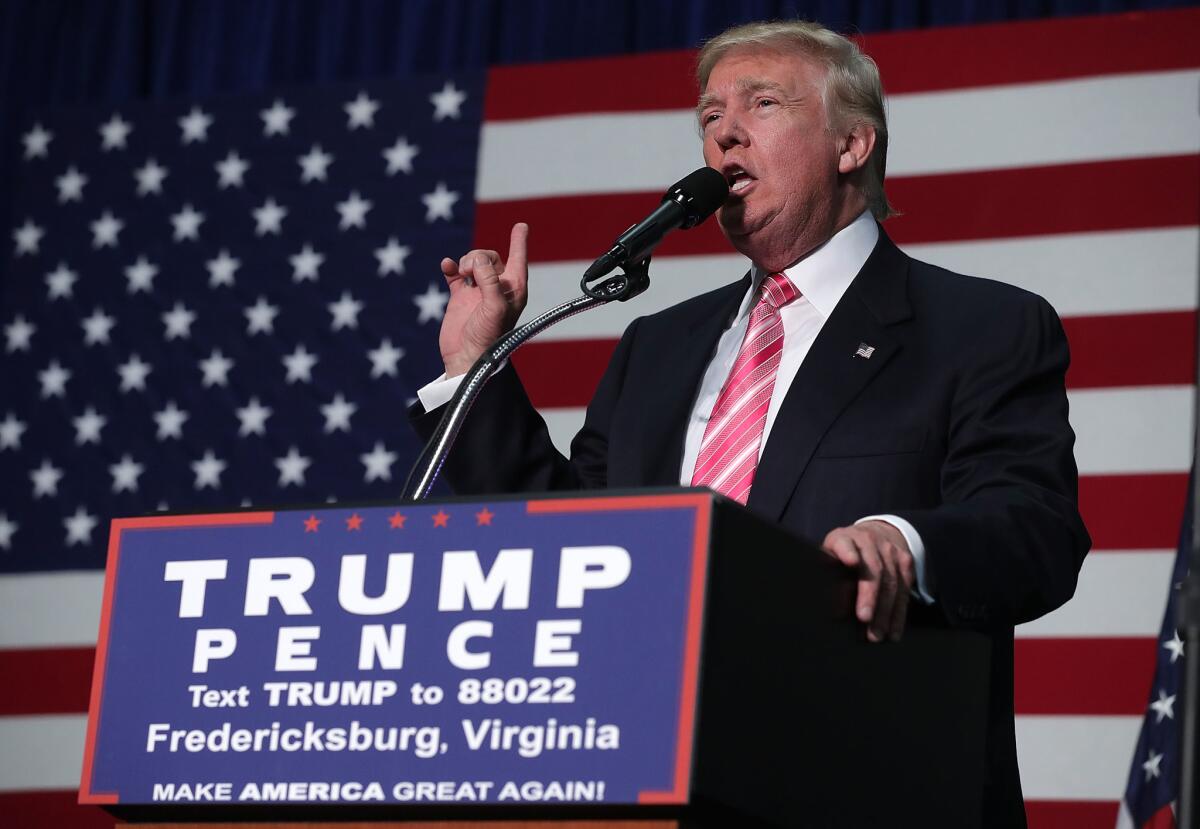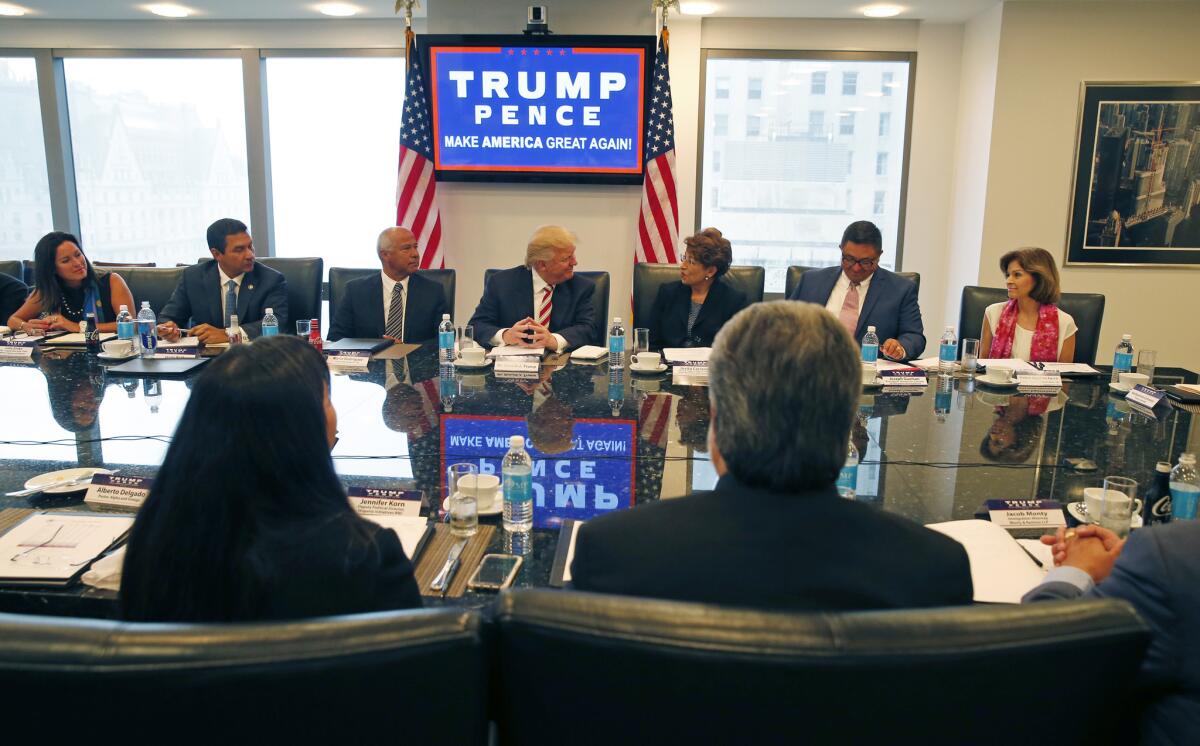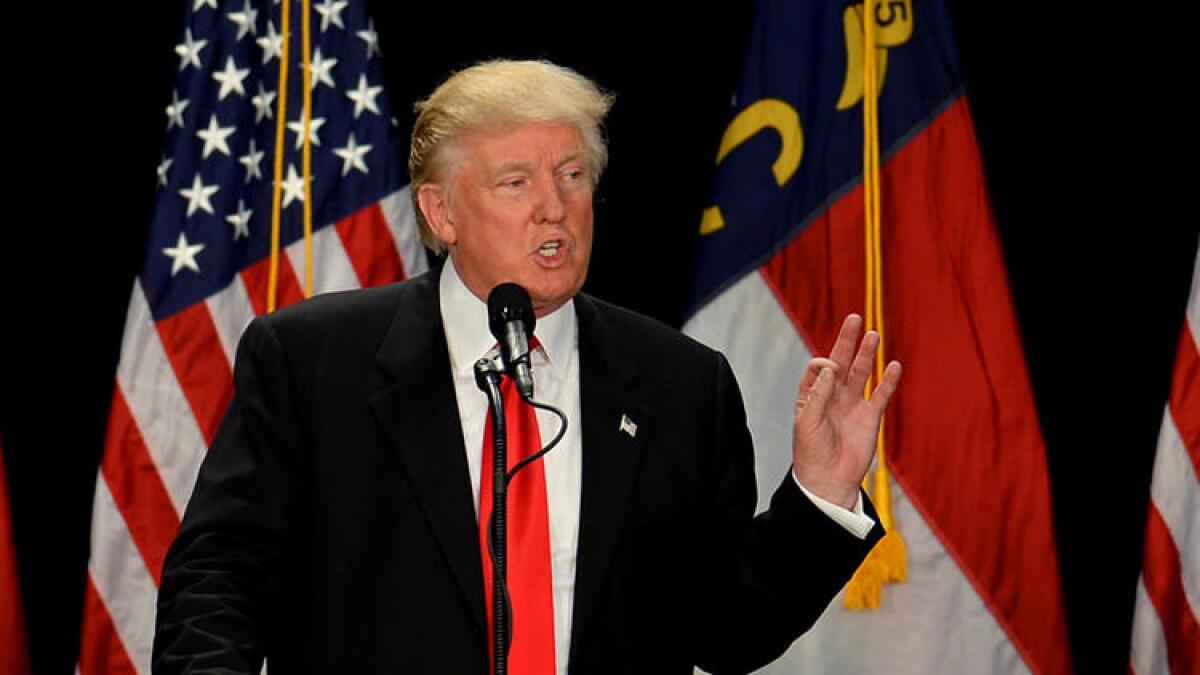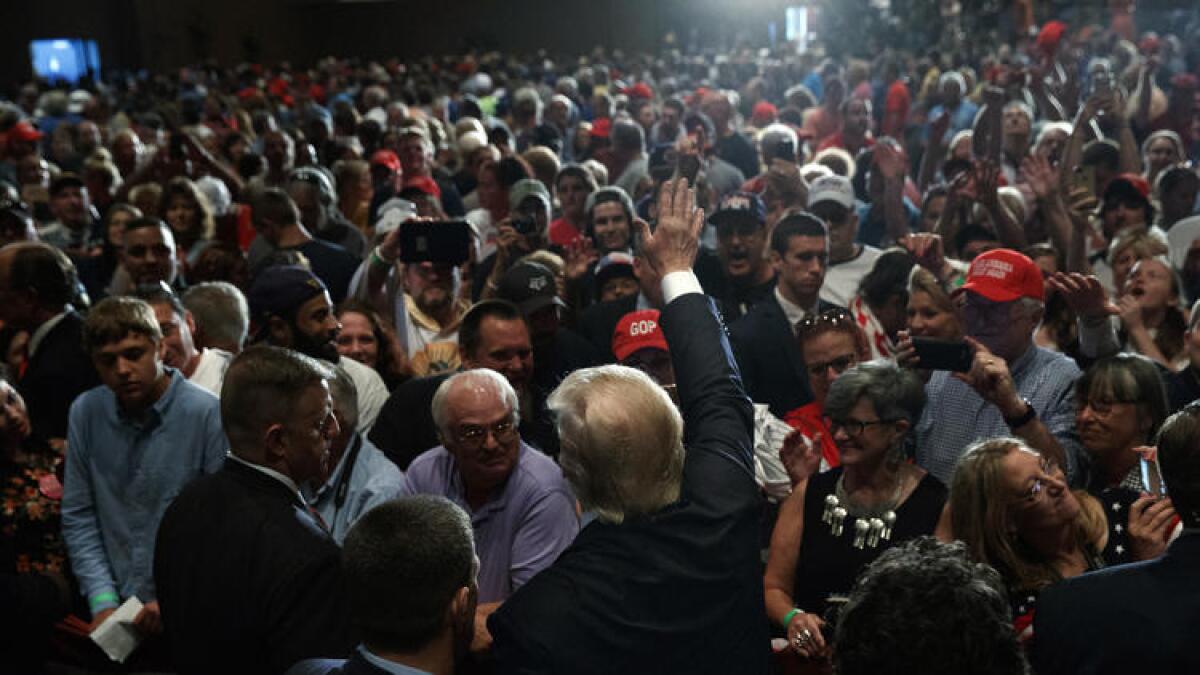Donald Trump’s media obsession led him to hire the head of a far-right news site to run his campaign
- Trump sat down with members of his newly formed National Hispanic Advisory Council
- The billionaire businessman’s calls for election observers bring back memories of intimidation in Santa Ana in 1988
- Hillary Clinton is ordered to answer questions about her emails
- The race to 270 - what states matter?
Donald Trump—again—assails Virginia effort to get ‘violent felons to the voting booths’

When Donald Trump speaks in Virginia he often mentions a push by Democrats to restore the voting rights of tens of thousands of felons in the state.
Trump continued that trend Saturday, castigating efforts by Virginia Gov. Terry McAuliffe, an ally of Democratic presidential nominee Hillary Clinton, to allow felons back in the polling booth.
“Clinton is banking on her friend Terry McAuliffe getting thousands of violent felons to the voting booths, in an effort to cancel out the votes of both the law enforcement community and crime victims,” Trump, who has sought to cast himself as the “law and order” candidate of the race, said Saturday at a rally in Fredericksburg.
McAuliffe, a Democrat, issued a sweeping executive order in April that would have restored voting rights to more than 200,000 felons, but Virginia Republicans filed suit, and the effort was eventually blocked by the state Supreme Court as unconstitutional. The court said McAuliffe did not have the authority to restore rights en masse and had to consider each case individually.
Now, according to the Washington Post, McAuliffe plans to restore the voting rights of nearly 13,000 felons on a case-by-case basis.
Virginia has some of the strictest laws when it comes to voting rights for felons. The nonpartisan Sentencing Project estimates that 1 in 5 African Americans in Virginia is disenfranchised by the laws -- something McAuliffe and Democrats have said they want to halt. A recent Washington Post poll found that 61% of adults in Virginia support McAuliffe’s effort.
In what amounted to measured remarks on Saturday, Trump, reading from a teleprompter for the fourth straight day, jabbed Clinton for, among other things, her use of a private email server while at the State Department.
Moreover, he continued his pitch to black voters, who in Virginia are helping Clinton maintain a sizable lead over Trump.
“The GOP is the party of Lincoln, and I want our party to be the home of the African American vote once again,” he said.
Here’s how much money Trump and Clinton raised in July
Democratic mega-donors, including George Soros and Tom Steyer, are putting millions of dollars into efforts to put Hillary Clinton in the White House.
Yet few of the GOP’s biggest donors have put major money into Donald Trump’s efforts, a striking change from four years ago, when Mitt Romney had more million-dollar donors on his side than did President Obama.
The presidential candidates and many outside groups must report their July fundraising and spending details to the Federal Election Commission by midnight Saturday.
Ahead of their filings, Trump and Clinton announced their July fundraising totals.
Clinton’s July FEC report shows her campaign’s work to bring small donors into the fold is paying off. Her Democratic primary rival, Bernie Sanders, had strong appeal online and had routinely trounced her on the small-money front. In July, contributors giving $200 or less accounted for $11.4 million of Clinton’s fundraising — roughly double the amount they gave her in June.
These small donors helped Clinton raise about $90 million last month for her campaign and Democratic Party allies.
Trump, who did not raise much money during the primary and had no finance team until late May, has proven a surprisingly strong fundraiser. In July, he raised more than $80 million for his campaign and allied Republican Party groups, his campaign said.
Clinton’s campaign began this month with about $58 million in the bank. Trump’s campaign said that as of Aug. 1 it had $37 million in cash and another $37 million in joint accounts with the Republican National Committee.
Campaign finance documents will give details about how both candidates spent their money in July.
Donald Trump meets with Latino leaders

Donald Trump sat down Saturday with Latino leaders from nearly a dozen states in his latest effort to appeal to minority voters who have largely spurned his struggling campaign.
After waging a year-long campaign marked by divisive and racially coded rhetoric, the Republican nominee reached out to African Americans several times this week.
He insisted at rallies in Wisconsin and Michigan that he would do a better job than Hillary Clinton, his Democratic rival, at creating jobs and improving schools for black families.
On Saturday, he focused on Latino voters.
In a round table discussion with his campaign’s Hispanic advisory council at Trump Tower in New York, the real estate mogul talked about creating jobs and his plans to limit immigration, according to attendees.
Colorado State Rep. Clarice Navarro, a member of the council who attended the meeting, said Trump heard the group’s concerns.
“It’s about jobs, jobs, jobs, and he really listened,” said Navarro, a Republican. “I’ve always felt he does care about the Latino community and now it’s on us to get him elected.”
During the meeting Trump also suggested he is interested in figuring out a “humane and efficient” manner to deal with immigrants in the country illegally, according to BuzzFeed.
Trump’s invective this election cycle — he denounced Mexican immigrants as “rapists” and drug runners in his first campaign speech — is unlikely to help his low standing with Latinos.
A national Fox News poll of Latino voters this month showed Clinton holding a 46-point advantage over Trump.
Clinton wallops Trump 91% to 1% among African American voters, according to a recent Wall Street Journal/NBC News/Marist poll.
Trump is set to hold a rally Saturday night in Virginia, a swing state where polls show Clinton leading Trump by a sizable margin, partly because of the state’s large African American population.
President Obama won Virginia in 2008 and 2012, the first Democrat to win the state twice since Franklin Roosevelt in 1944.
Updated 4:54 p.m. This post was updated with news about Trump’s views on those in the country illegally.
Snapshot from the trail: Mike Pence in Iowa
Donald Trump’s media obsession led him to hire the head of a far-right news site to run his campaign
It seemed bizarre. But Donald Trump’s choice this week of a renegade, far-right news executive to lead his campaign was an inevitable culmination of a candidate’s war with the mainstream media and his embrace of his party’s most incendiary voices.
Trump’s obsession with the media has been one of the few constants in his campaign. He rails against “scum” reporters, withholding credentials from major news organizations and lashing out on Twitter this week against the “failing New York Times,” while granting lengthy interviews to those same outlets and basking in their attention. He exploits the divide in conservative media to bash enemies and create safe zones on select television and radio shows. He questions the core tenets of the 1st Amendment and flouts the judgment of fact-checkers with abandon.
Justin Timberlake to fill in for Leonardo DiCaprio at Hillary Clinton L.A. fundraiser?
Amid campaign chaos, Donald Trump seeks reboot

Seeking to move past the tumult that has damaged his campaign since he accepted the GOP presidential nomination, Donald Trump tried this week to broaden his appeal and sow the seeds for a competitive fall race against Hillary Clinton.
Trump shook up his campaign leadership, launched television ads, gave one of the best speeches of his candidacy and quietly visited flood-ravaged Louisiana. But much of his effort was overshadowed by the announcement Friday that his campaign chairman, Paul Manafort, had resigned, completing the shift in power at the top of Trump’s campaign but keeping alive the sense of turbulence within the operation.
Trump must “let the media have enough time to kind of contemplate everything you’ve said versus continuing to give them a buffet of things to distract them,” said Craig Robinson, a former state Republican official in Iowa. “This is where message discipline matters. Don’t step on your own story.”
Donald Trump’s call for poll watchers brings back fears of 1988 Santa Ana

The phone calls to Donald Tanney’s office began shortly after polls opened on that election day nearly three decades ago.
Tanney, then Orange County’s registrar of voters, was told that when residents — mostly Latino — arrived at 20 Santa Ana polling locations on Nov. 8, 1988, they were greeted by uniformed guards holding signs with a message in Spanish and English: “Non-Citizens Can’t Vote.”
The guards, dressed in navy blue attire, had been hired by the campaign of Curt Pringle, a Republican state Assembly candidate from Garden Grove, and the Orange County Republican Party. Their mission? Monitor the polling places to ensure no fraudulent ballots were cast, insisted Pringle and officials from the county GOP.
“It was bad,” Tanney recalled. “People were really upset.”